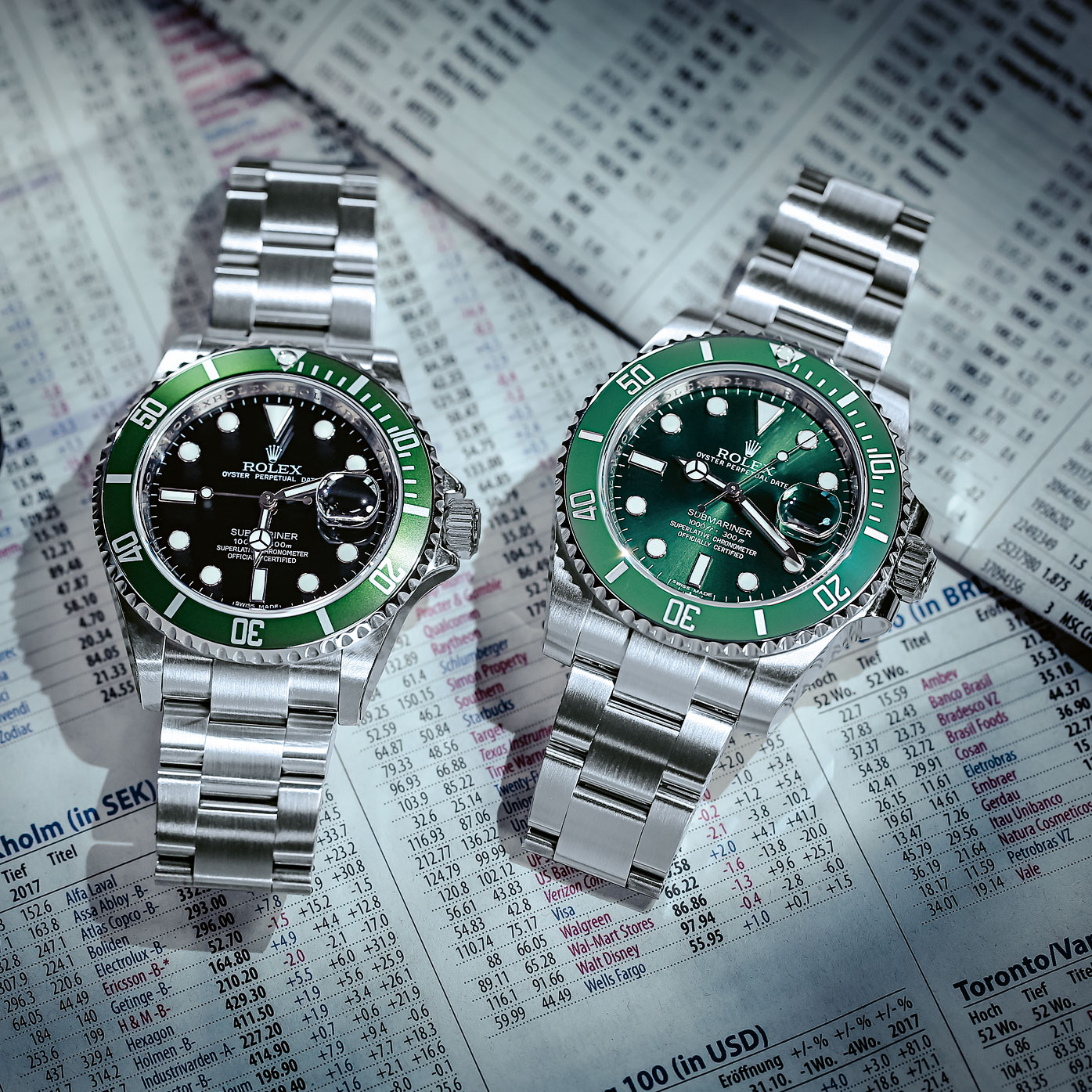
Artikel
15
januari
Tools for the Depths: The Dive Watches of Rolex
Dive watches from Rolex are highly sought after. And it’s no wonder with such an exciting history, a number of noteworthy collaborations, unique designs and robust, accurate in-house movements. We explore the various models in this feature from the WatchTime archives.
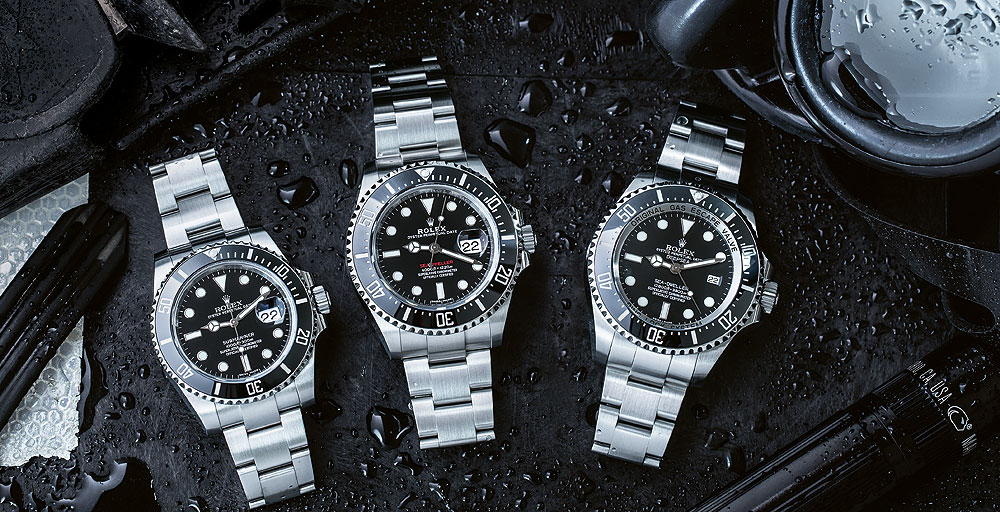
Rolex currently produces four different dive watch models: the Submariner and Submariner Date, the Sea-Dweller and the Deepsea (listed here in order from lowest to highest in both size and price). The Submariner and Submariner Date share the same case size. Almost all watches in this collection offer versions with different materials, dial and bezel colors. The Submariner without a date indication is the entry-level piece and is priced at $7,500. Introduced in 1953, it was the first dive watch from Rolex. At that time, it had a bidirectional rotating bezel for measuring dive time. Initially, the Submariner was water resistant to 100 meters, but by 1954 Rolex had already increased this level to 200 meters. In 1955, the English Royal Navy began using the Submariner as its official dive watch and the Royal Canadian Navy followed suit the following year.
Rolex first became famous in 1927 for its water-resistant watches with their patented screw-down crown, and the ingenious Oyster name was an effective marketing tool. During her more than 15-hour attempt to swim the English Channel, Mercedes Gleitze wore a water-resistant Rolex that withstood the ordeal. Rolex took out a front-page ad in the London Daily Mail to publicize the event that won the watch great acclaim.
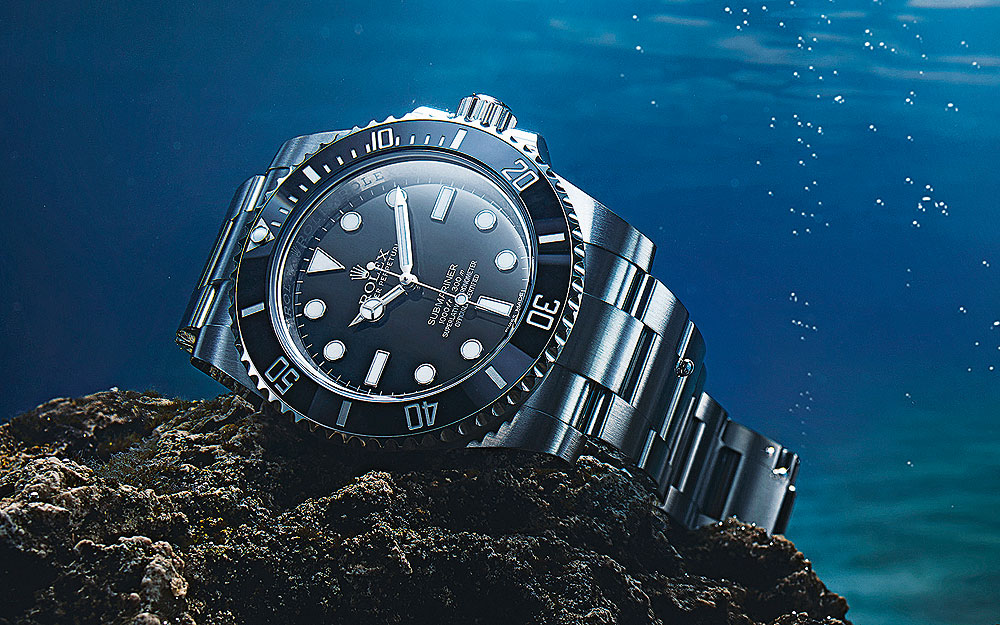
Rolex also developed the Deep-Sea Special watch to explore the ocean depths. Between 1953 and 1960 it participated in several maritime expeditions, attached to the outer hull of submarines. The high point (or low point) was reached in 1960 when Jacques Piccard and Don Walsh maneuvered their Trieste submersible vessel down into the Mariana Trench to a depth of 10,916 meters, just a few meters short of the deepest point in the sea. The Deep-Sea Special survived unscathed. Although several pieces of this model were built, it never went into serial production. With a semi-spherical crystal and an overall height of 35 mm, it would still be too large to be considered wearable.
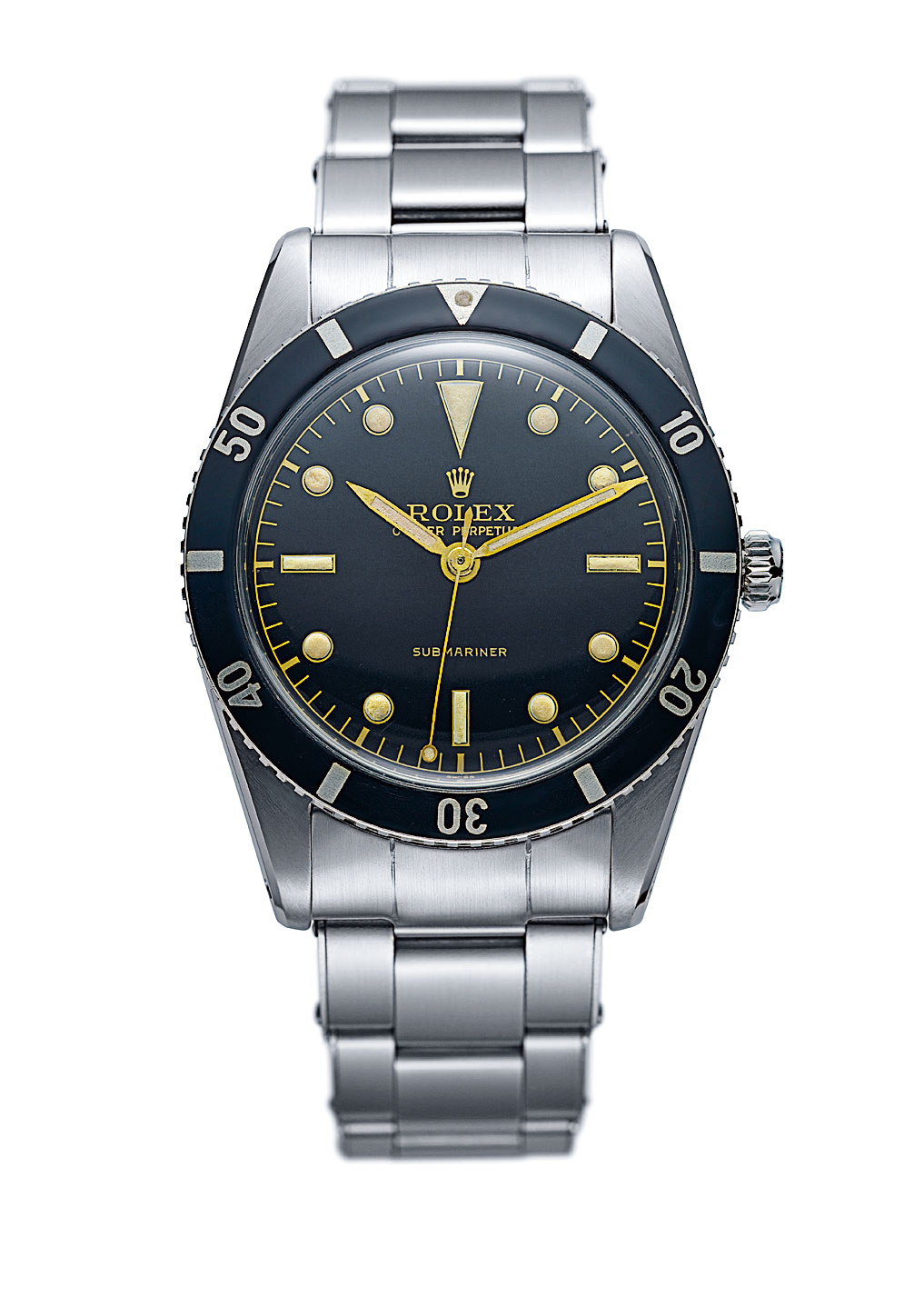
Submariner
Today’s Submariner measures 40 mm in diameter and 12.5 mm in height, which is slim for a dive watch. The watch without a date indication is powered by the self-winding in-house 3130 movement and with a date, by the 3135. Both calibers boast a power reserve of 48 hours. Chronometer certification from the independent testing agency COSC guarantees accuracy, alongside the company’s own stricter standards, which specify that every Rolex watch may not gain or lose more than 2 seconds per day. The Glidelock system can extend the bracelet for a precise fit and allows the Submariner to be worn over a wet suit. Like all Rolex dive watches, it has a metal bracelet and a unidirectional rotating bezel with a ceramic inlay.
Sea-Dweller
Saturation diving was developed in the early 1960s. When working at deep-sea locations, professional diving companies took advantage of the fact that after 24 hours under pressure, the human body will not absorb additional nitrogen, thereby limiting the time required for decompression. So to prepare themselves for working for extended periods at deep locations, professional divers would spend several days inside a pressure chamber filled with a helium-nitrogen-oxygen mixture. Once their underwater task had been completed, the pressure in the chamber was gradually reduced to normal levels. During this process, crystals from the divers’ watches would often pop out of their cases due to the helium trapped inside the watches. Divers in the Sealab program experienced this problem while helping the U.S. Marines carry out research on the effects of high pressure and various breathing gases on the human body.
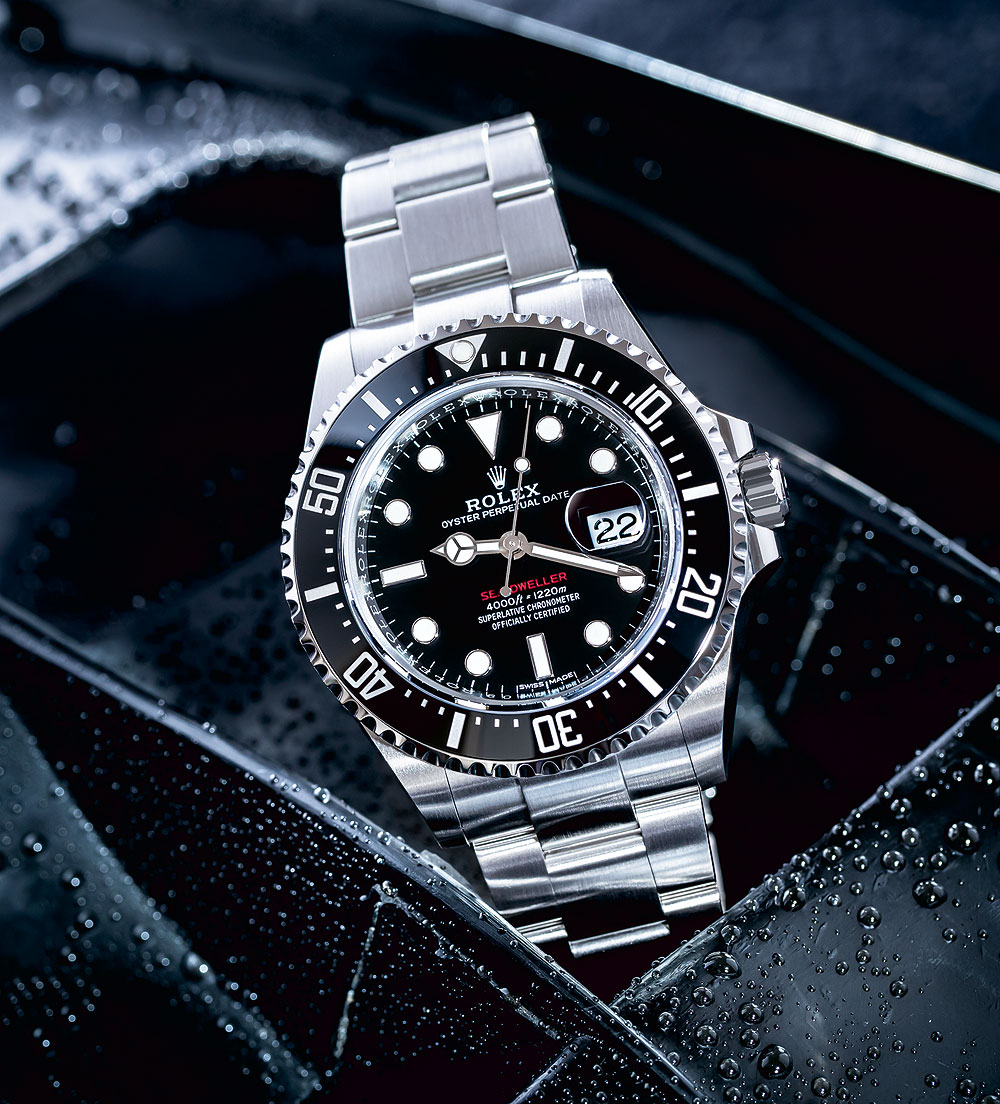
A Sealab diver reported the problem to Rolex and suggested adding a pressure relief valve to safely release the helium that had penetrated the watch. Rolex then developed its helium escape valve, which would be adopted by many other brands.
Rolex began working with the French diving specialist Comex in the early 1970s and supplied watches to all Comex divers, who then shared their experiences and helped with the ongoing development of the watches. Comex laid underwater cables, took care of diving work on oil rigs and salvaged shipwrecks. While doing so, they developed their own special tools and experimented with breathing gas mixtures. Comex set a number of depth records and a Sea-Dweller was on the wrists of their divers as they subjected themselves to each torturous trial. In 1972, two divers withstood 50 hours in a pressurized chamber measured at 610 meters deep. Later, Comex employees worked in the ocean at more than 500 meters, and in 1992, a Comex diver achieved a depth of 701 meters inside a pressure chamber. What Comex really needed was the Sea-Dweller with its three times higher water resistance and a helium escape valve.
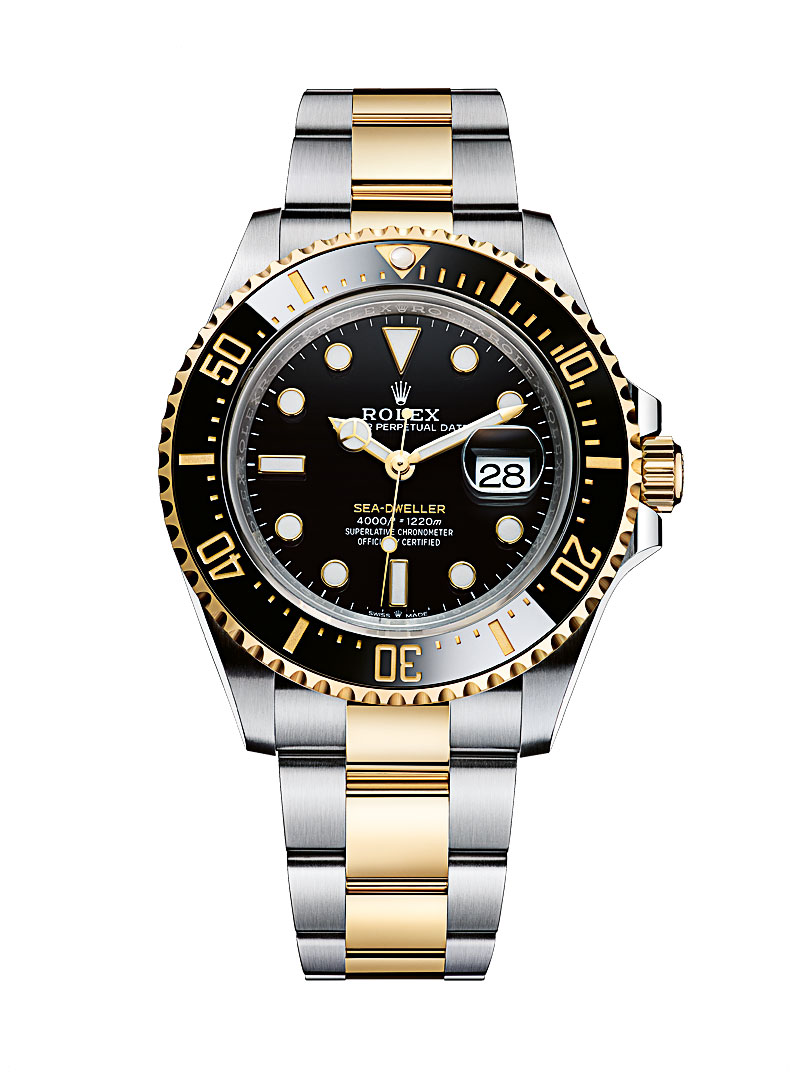
In the mid-1960s, Rolex supplied Comex with specially equipped Submariner models to test the helium escape valve. Today, these “Rolex Comex” watches (Ref. 5514) are as expensive as they are rare. The Sea-Dweller went into mass production in 1967, equipped with a helium escape valve. The new model was able to withstand pressure to a depth of 610 meters. It remained similar in design to the Submariner. In 1980, Rolex doubled the Sea-Dweller’s water resistance to 1,220 meters. And to mark the 50th anniversary of the Sea-Dweller in 2017, Rolex issued a new model that replaced the previous model introduced in 2014. With a current diameter of 43 mm and a height of 15 mm, and with the iconic Rolex Cyclops date magnifier, the watch looks much like an enlarged Submariner but with continuous 60-minute markers on the divers’ bezel and red lettering on the dial.
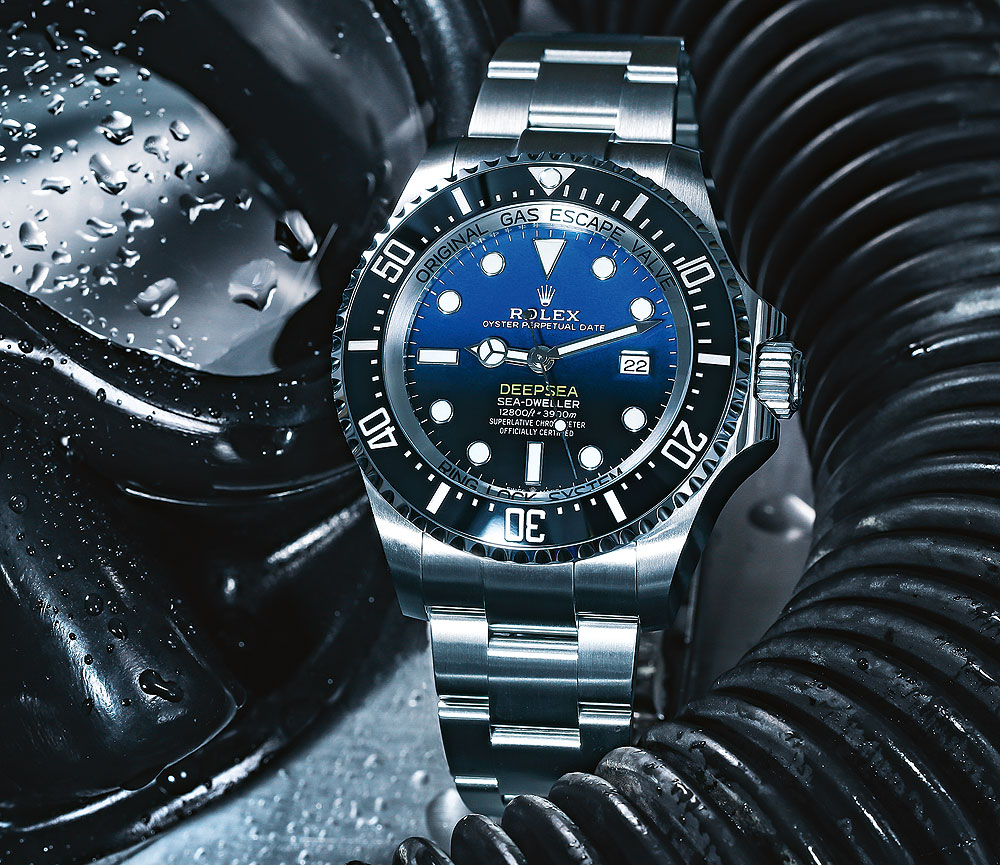
Deepsea
The maximum depth limit remained unchanged until 2008, when the Deepsea model was introduced with a water resistance of 3,900 meters. Rolex developed a completely new case design to ensure that the watch would not be too large despite its tremendous water resistance. Its patented “Ringlock” system consists of three elements that can take the pressure: a 5.5-mm-thick sapphire crystal, a 3.28-mm grade 5 titan-ium caseback and an inner ring made of BioDur 108 steel. The system is surrounded by the 904L steel that Rolex uses for the case. The titanium caseback is pressure-fit to the inner ring by a threaded 904L steel caseback ring.
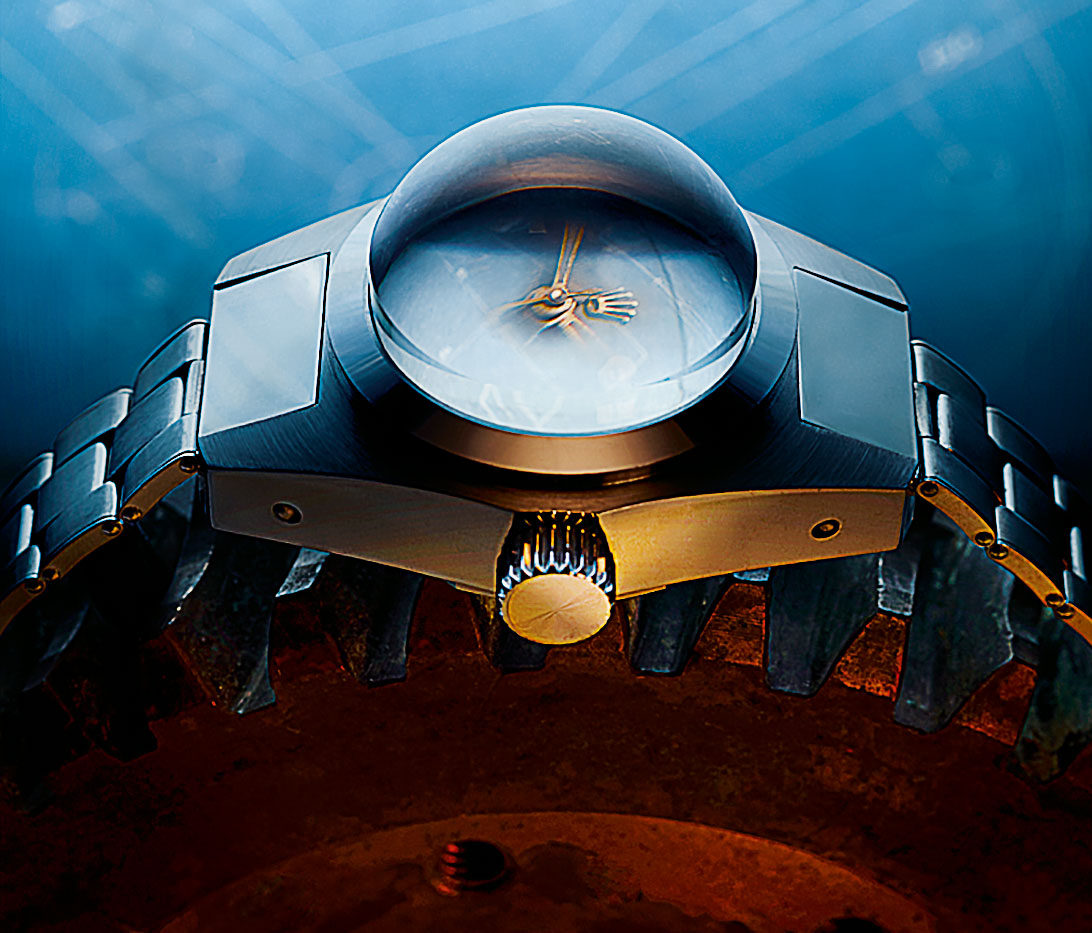
The materials are carefully selected; they exhibit both strength and resilience and do not easily deform or break under pressure. The complicated design permits a 44-mm-by-18-mm case that is both striking and 10-percent thinner than other cases with a similar construction. The Deepsea is designed to withstand depths of up to 4,900 meters. Each individual watch undergoes rigorous underwater testing at this 25-percent higher pressure. The Deepsea was updated in 2018 and now has a more balanced case and a new in-house movement with a power reserve of 70 hours. Like the Sea-Dweller, the Deepsea has a Fliplock extension piece that permits fine incremental extension of the bracelet up to an additional 26 mm.
The year 2012 marked another important underwater project, the “Deepsea Challenge.” And Rolex was a partner once again. The filmmaker James Cameron was the first person to successfully reach what was at that time the deepest point below sea level after the first famous expedition in 1960. Attached to the outside of his submersible vehicle was another specially designed concept watch by Rolex: the Deepsea Challenge, which was water resistant to a depth of 12,000 meters. It relied on the Ringlock system and achieved wearable dimensions of 51.4 mm in diameter and 28.5 mm in height.
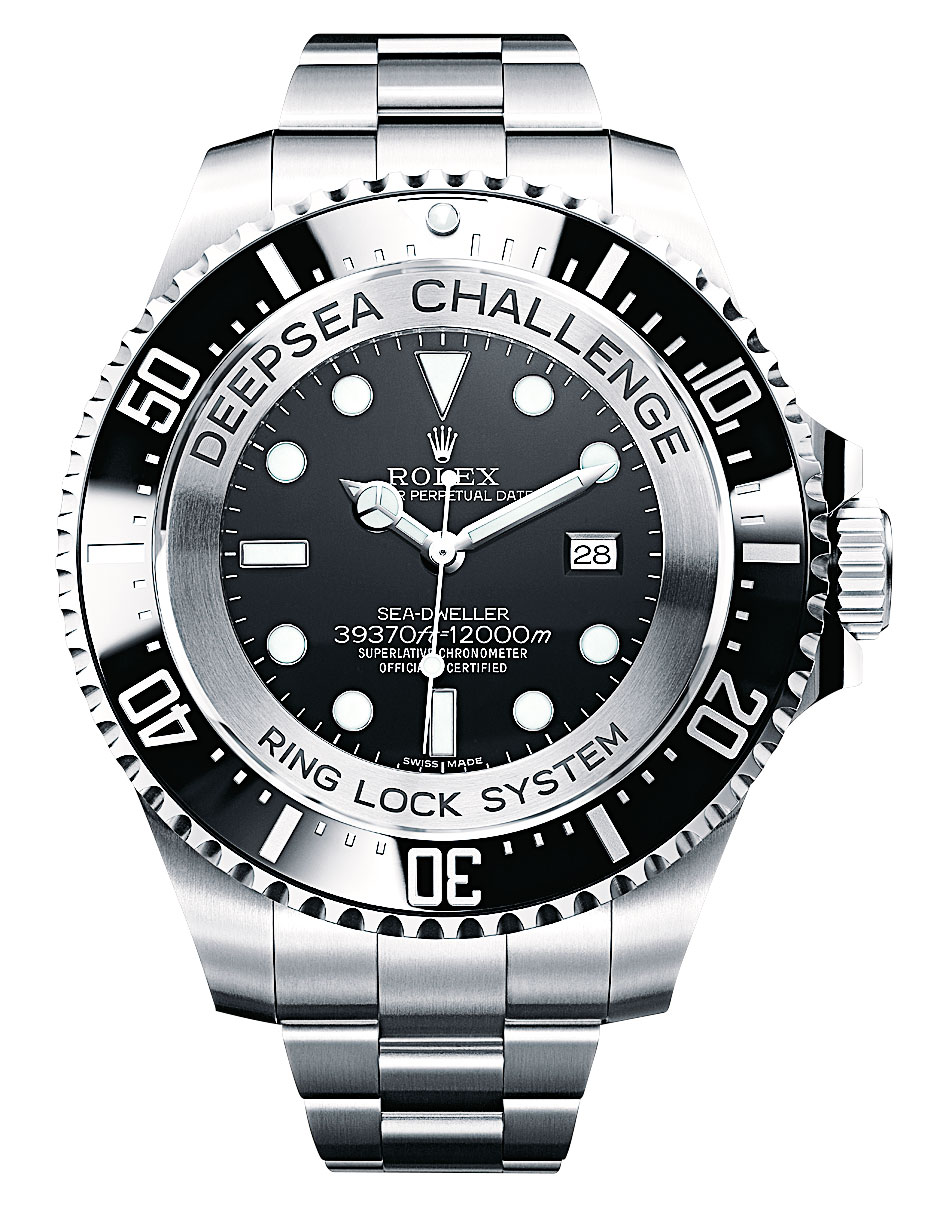
Variations
With the exception of the Submariner with no date, every Rolex dive watch offers different options. The Deepsea is available with a black dial or with one that transitions from black to blue. As of 2019, the Sea-Dweller is available in both steel and steel-and-gold versions. The steel Submariner is offered with a black or green dial and matching bezel. It is also available in yellow gold and in steel and gold, and with either option the customer can choose a black or blue dial and bezel. A white-gold version is offered with a blue dial and bezel only. All in all, the dive watch collection consists of 12 different versions.
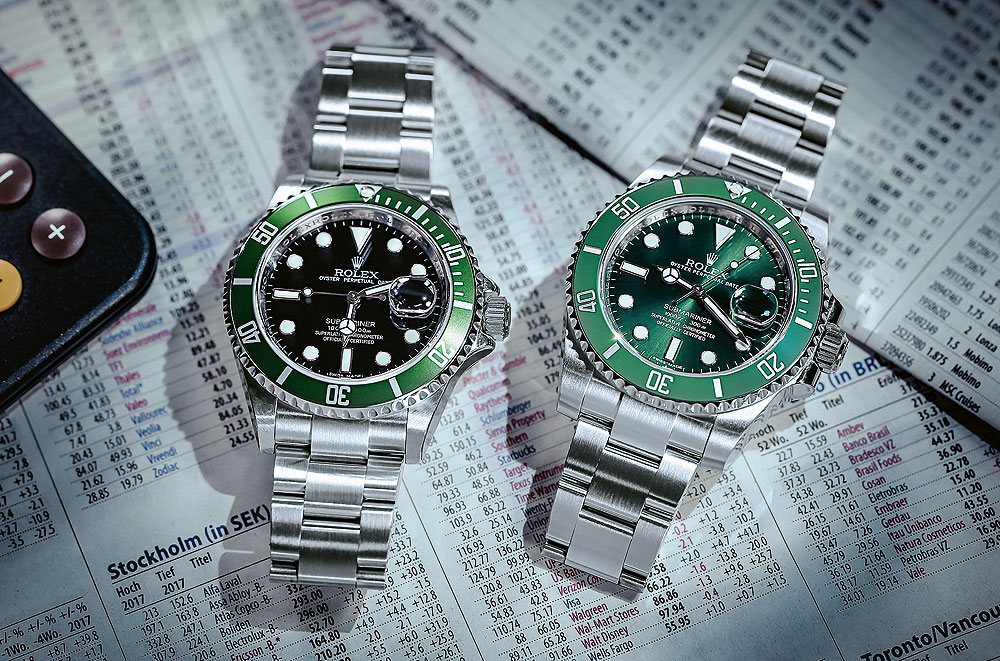
Prices begin at $7,500 for the no-date Submariner, followed by the Submariner Date at $9,050. Models with a helium escape valve are considerably more expensive – the Sea-Dweller is offered at $11,350 and the Deepsea at $12,250. The most expensive model is the white-gold Submariner at $36,850. Despite the limited optical variety of these offerings, there is a suitable divers’ watch from Rolex for every size wrist and almost every wallet.
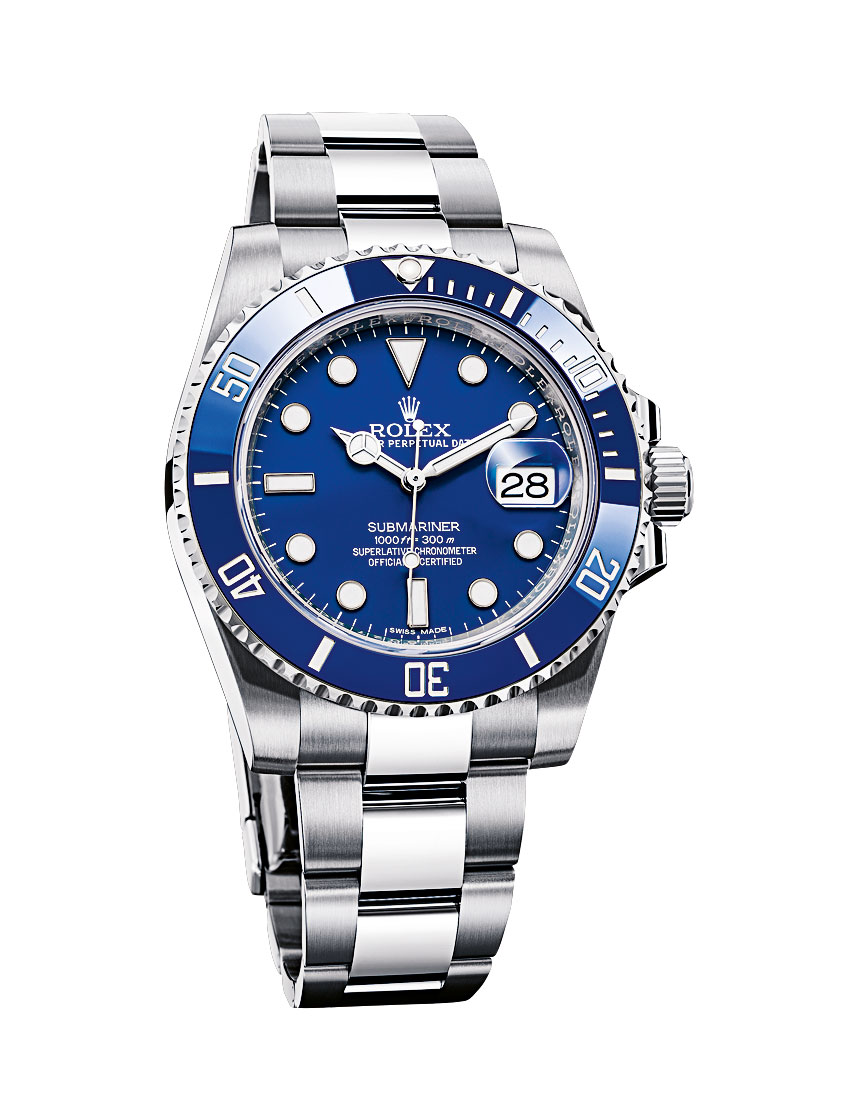
What's your reaction ?
Follow us on Social Media
Some Categories
Recent posts

November 22, 2024
Loonkosten 2025: hier kun je als werkgever op rekenen

November 20, 2024
Books Article

November 19, 2024
Hoe Aristoteles nu zorgt voor impactvolle communicatie

November 16, 2024
Loonkosten 2025: hier kun je als werkgever op rekenen

November 09, 2024
Dit betekent het regeerakkoord voor jou als ondernemer

 Inloggen
Inloggen
 Registreren
Registreren






Comments (0)
No reviews found
Add Comment